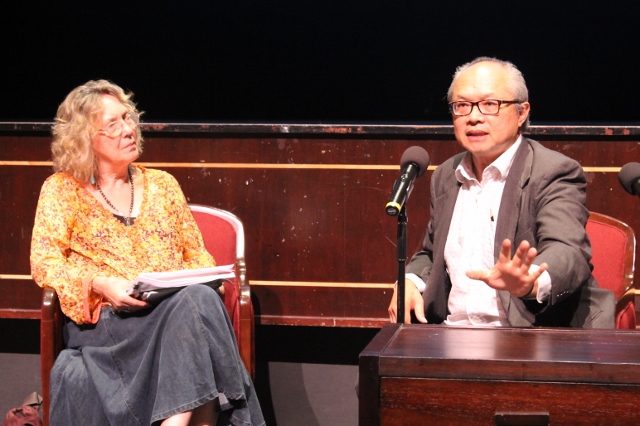What do you get when you cast a world-class artist, a devoted environmentalist, and a poet laureate together on one stage?
Answer: a very fine alchemy, where art, science, and education merge, and — if the featured guests have their way — the results may provoke social transformation.
That provocative alchemy was on view at Diana Wortham Theater Thursday evening, Aug. 30, when North Carolina Poet Laureate Kathryn Byers joined Riverlink’s Karen Cragnolin and internationally known artist Mel Chin in a program addressing the intersecting worlds of education, art and the environment.
And in case you didn’t think those worlds overlap much, read on.
The Asheville Art Museum hosted the program in partnership with the North Carolina Museum of Art series, “Summer Educator Expo: Environment in Focus.” The programs are supported by a grant from the GlaxoSmithKline Foundation; the goal of these seasonal events is to support teachers in communities across the state, whether they teach in the science lab or the art studio. The program seeks to provide cutting-edge curriculum ideas, sources, and materials to inspire what Chin refers to as “an atmosphere of desire” — a classroom where teachers enable students to engage history, science, art, and culture in ways that may catalyze social action.
An audience of more than 100 local teachers was treated to the free program including hors d’oeuvres and wine at happy hour, followed by a panel discussion moderated by Mark Sidelnick, education professor at UNCA. Small group sessions were followed by a guided exploration of the galleries at the Asheville Art Museum, led by Chin.
A native of Houston now living in rural Western North Carolina, Chin is an award-winning artist who — after a series of successful gallery and museum exhibits — abandoned the creation of art objects to pursue a more activist, ecological body of work. He began Revival Field in 1990, a landscape project centered on green remediation, where selected plants are used to remove environmental contamination from polluted soil. His current endeavor is Operation Paydirt, a multidisciplinary project to address lead-contaminated soil in urban areas and help end this source of childhood lead poisoning. (For more about the artist, read the Aug. 15 Mountain Xpress story “No Book was Destroyed in the Making of this Exhibition.”)
Identifying himself as “a subversive,” Chin argues that his art is “a democratic means to express hope,” perhaps especially in cities like Chicago and New Orleans, where high soil levels of lead co-occur with shocking fidelity beneath areas having the highest crime rates.
“We’re using art as a delivery system to approach a new audience,” said Chin, with the mildest Texas drawl. “It offers a voice to those who are most embattled.”
His interest in green remediation mirrors that of local environmentalist Karen Cragnolin, who has promoted the use of plants inoculated with special bacteria to consume the contaminants present in the soil at RiverLink’s latest addition to the Wilma Dykeman RiverWay. The project is reportedly cleaning up volatile organic compounds released over the decades on property that once hosted the EDACO junk yard on Amboy Road.
Such projects represent what Poet Laureate Kathryn Byers referred to as an enlightened society’s desire for “reclaiming the heart through nature education.” Byers offered an example of her earthy poetry, explaining her view of verse as a force in building community, where art is “a living force … a membrane that holds us all together.”
The program was developed by Asheville and Raleigh museum staff, together with the Arts Education Advisory Committee under the leadership of Susan Hensley, Arts Education Coordinator at the Buncombe County Schools.
Hensley tells Xpress that these events are intended as a kind of intellectual pampering for teachers — at a time when state budget cuts have trimmed many public school arts programs to the bone. Undeterred, she laughs and says, “We’re gonna hang in. If the arts survived the inquisition, we’re gonna survive budget cuts.”



Before you comment
The comments section is here to provide a platform for civil dialogue on the issues we face together as a local community. Xpress is committed to offering this platform for all voices, but when the tone of the discussion gets nasty or strays off topic, we believe many people choose not to participate. Xpress editors are determined to moderate comments to ensure a constructive interchange is maintained. All comments judged not to be in keeping with the spirit of civil discourse will be removed and repeat violators will be banned. See here for our terms of service. Thank you for being part of this effort to promote respectful discussion.